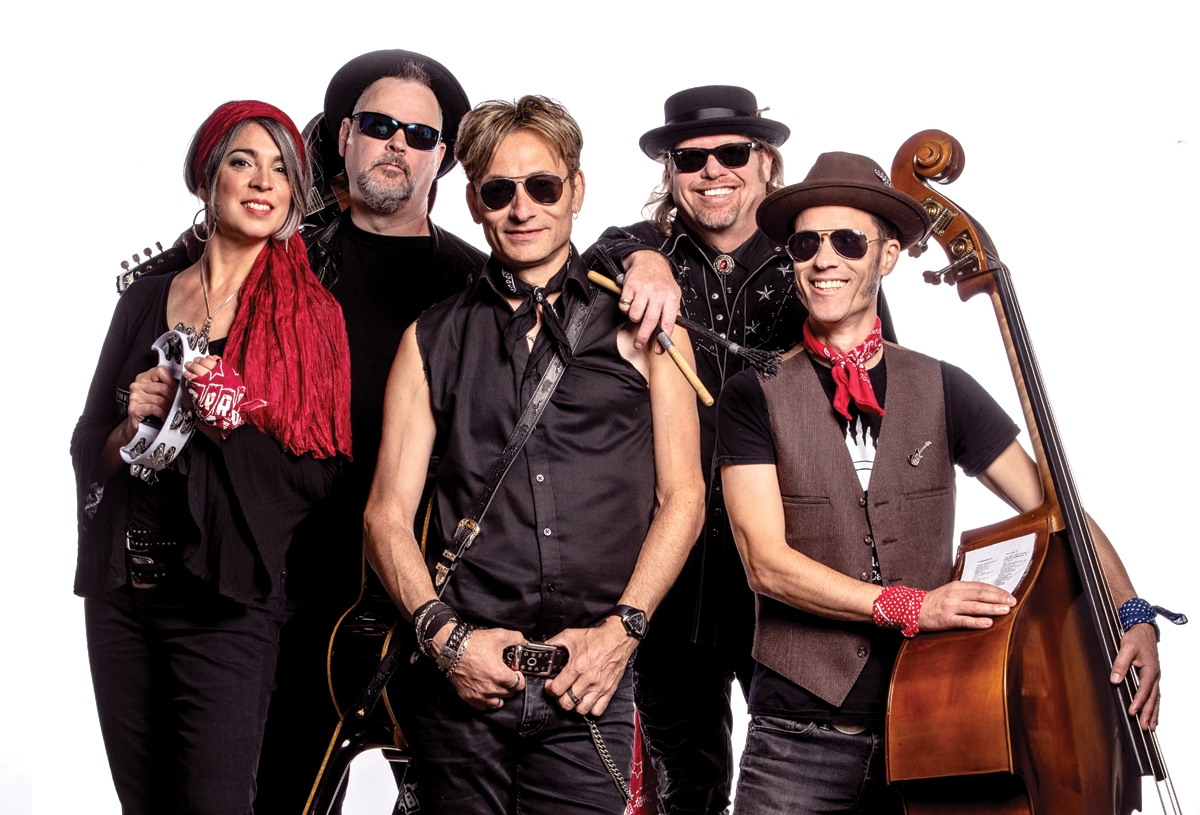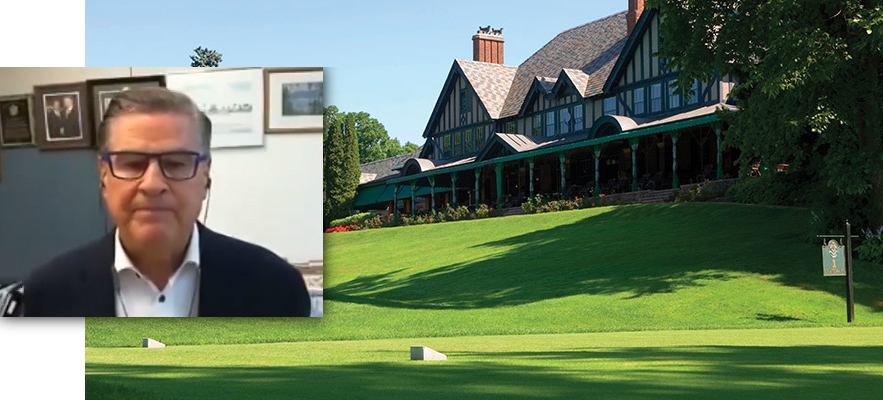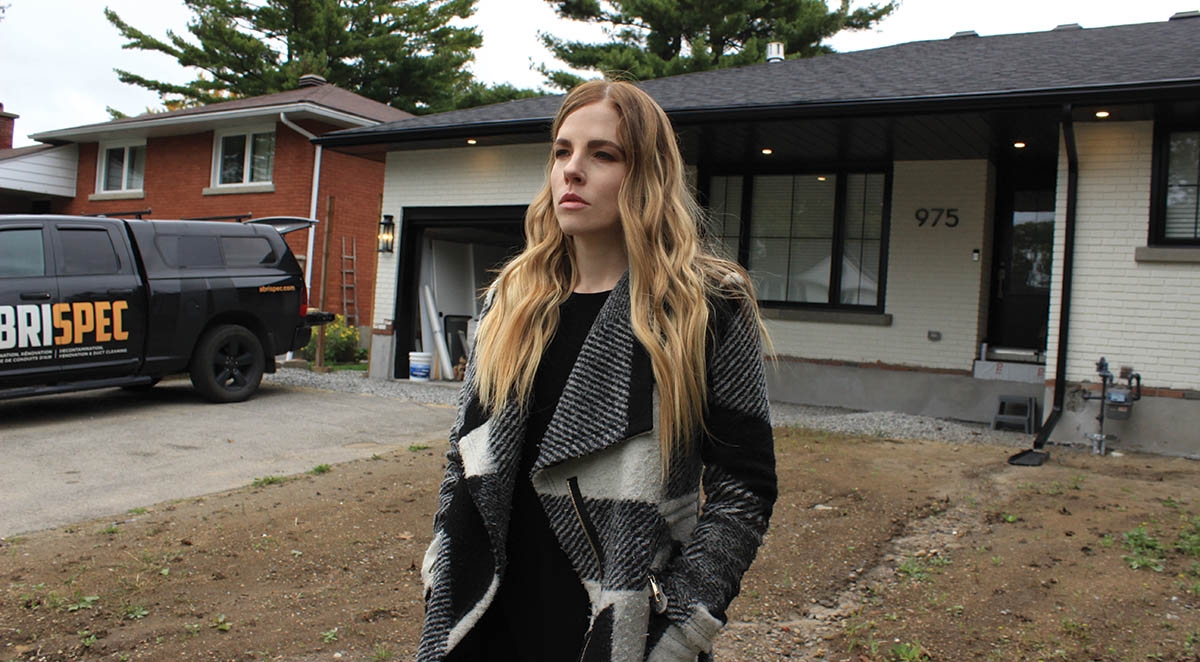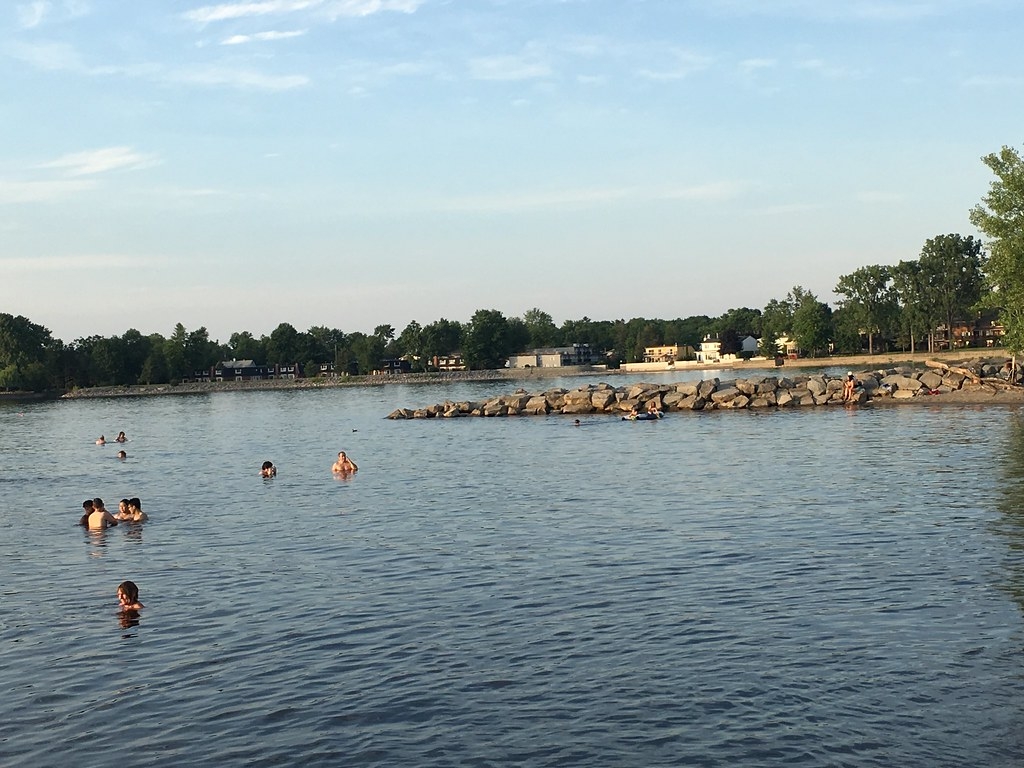
The Royal Ottawa Golf Club could learn a lesson or two from The Barrow Gang Buskers
Above: The Barrow Gang Buskers spent the spring and summer busking in parks, on sidewalks and in areas throughout the region while adhering to pandemic rules. (PHOTO: SEAN SISK PHOTOGRAPHY)
When I first read the CBC report that The Royal Ottawa Golf Club (ROGC), one of the country’s most prominent private courses, has banked a $1-million surplus from its past season, thanks mostly to federal subsidies for workers’ wages during the COVID-19 pandemic, I was gob smacked and like many people, more than a little disgusted. The ROGC is located across the river in Gatineau was founded in 1891 and offers what it calls “privileged” status to cabinet ministers, the leader of the Official Opposition, accredited high commissioners and ambassadors to Canada and their respective spouses. Several NHL players have also been members.
The first thought that came to my mind when learning about this was a famous line former Prime Minister Brian Mulroney used, in 1984, when describing people who take advantage of the system: “There’s no whore like an old whore” (He was referring to abuse of patronage appointments by former Prime Minister Pierre Trudeau). I have sat on several boards in the past two decades including being a Governor of Canada’s Sport Hall of Fame, and it would never occur to the many honourable people I have served with on any board to do such a thing. A case in point is one of the current boards I serve on called the Weengushk Film Institute (WFI). This organization is a non-profit, artist-focused film and television-training centre, dedicated to unlocking the creative potential of Indigenous youth. Located on Manitoulin Island WFI was created by Shirley Cheechoo, a Cree and a residential school survivor who was born in Eastmain, Quebec on the eastern shores of James Bay. Shirley is a recipient of the Order of Canada and created WFI in the 1990s. Shirley and her small team of very dedicated staff have run the school on a shoe-string budget for almost two decades. Their work has changed the lives for the better for hundreds of young Indigenous people. WFI are now in a process of trying to raise funds to build a new school to expand and allow for more Indigenous students from across Canada to be in the film and digital media profession.
Anytime WFI applies for any funding they must go through multiple hoops and cross every ‘T’ and dot every ‘I’ or you can be sure some official will find a reason to delay or deny the application. All that to say, Shirley and her team keep at it for the students. One of the things that struck me at my first WFI Board meeting which was adjudicated by acting chair, and renowned Canadian filmmaker Phyllis Ellis was the responsible oversight and care the Board took to ensure that WFI was following all the rules regulations and by-laws that align with current CRA and standards and program rules when applying for anything. This spoke volumes about the meritorious nature of WFI and their honesty, principles, and values. It showed that the WFI had a board of directors who took their roles and responsibilities in protecting the reputation of WFI seriously and did not act in a cavalier or entitled manner when dealing with funding and financial matters. Like many, WFI had to temporarily close during the first lockdown and apply for COVID-19 assistance. Suffice it to say, it has been tough to get the funding and frankly tougher for the students and small staff who were sent home.

“In a video posted of the meeting Doug McLarty (pictured above) loftily claims that the club had a fiduciary duty to apply for the funds” (PHOTO: ROGC)
And therein lies the problem with the CEO and Board of Directors of The Royal Ottawa Golf Club (ROGC). They have shown a complete and abject failure in carrying out their duties, not only as a Board, but as citizens. Why an elitist private multi-million-dollar golf course would apply for funds during a pandemic meant to supplement or even temporarily replace workers’ wages is the first obvious question that comes to mind. You would think that a responsible board member would red flag this immediately out of concern for not only how it looks, but more importantly the appropriateness of doing it. Money collected for wage subsidies and not used directly for wages, is not only an abuse of the intended program, but is also a form of grift, manipulation, deceit, and trickery. From what we can surmise from the ROGC website and other available public information shared by the CBC and others, it appears this private club has close to 1200 members who pay a hefty initiation fee of up to $35k to join. There are also annual and other ancillary fees.
The story broke when the CBC News obtained some of the club’s audited financial statements, and a recording of its annual general meeting, in which its board told members about the club’s “very strong financial position” due to the Canada Emergency Wage Subsidy (CEWS) windfall. “We ended up with a rather substantial subsidy,” Doug McLarty, the club treasurer, told participants in the December 5, 2020 online video meeting. “It was over a million dollars. And that ended up on the bottom line.” As the CBC reported, “The ROGC faced lockdown restrictions that kept its facilities shut from mid-March through mid-May, the club sought and received $1.019 million in federal wage support over the spring and summer, and as a result, ended its fiscal year with an $825,000 surplus in its operating fund — 19 times more than the $43,883 operating gain the club reported for 2019. A healthy return on investments belonging to the club’s capital fund, along with some cost-savings, generated another $213,785, bringing the non-profit organization’s total 2020 surplus to $1.038 million.
In a video posted of the meeting McLarty loftily claims that the club had a fiduciary duty to apply for the funds because “pretty well every club in Ontario filed for the subsidy.” Members were told that the Royal Ottawa board decided to keep the entire amount to “provide a cushion against unanticipated future expenses. “Some of you said, ‘Well, you know, why don’t we just lower fees next year?’ Some of you suggested, ‘Why don’t we transfer some of it to the capital account?’ Some people said, ‘Why don’t we accelerate some expenditures?’ “All of which were legitimate ideas, good ideas,” said McLarty, a chartered professional accountant and certified financial planner, during his AGM presentation. “We debated all pros and cons of each one of those. But as I suggested earlier, we were trying to be conservative. At that point, we felt that we didn’t know what the next year was going to bring to us, and so we decided just to park it.”
Rather than question the veracity of this rather haughty statement, not one of the ethics challenged ROGC board members suggested returning the COVID-19 taxpayer money to the government since the club was running a substantial surplus and government could redirect it to help other victims of the pandemic. It quite evident none of them have a clue about the meaning of ‘fiduciary duty’. This alone is reason enough that they should all resign for incompetence or worse, possible fraudulent activity against the taxpayers of Canada.
For the record, a fiduciary duty is a commitment to act in the best interests of another person or entity.
Broadly speaking, a fiduciary duty is a duty of loyalty and a duty of care. In Canada, directors of corporations owe a fiduciary duty. A landmark judgment from the Supreme Court of Canada in BCE Inc. v. 1976 Debenture holders has led scholarly literature in Canada to define this as a “tripartite fiduciary duty”, composed of (1) an overarching duty to the corporation, which contains two component duties — (2) a duty to protect shareholder interests from harm, and (3) a procedural duty of “fair treatment” for relevant stakeholder interests. This tripartite structure encapsulates the duty of directors to act in the “best interests of the corporation, viewed as a good corporate citizen”.
By any measure, the CEO and the Board of the Royal Ottawa Golf Club have failed to meet this standard. Their acts in applying for the money in the first place and then accepting it and using it for their bottom line, in place of its intended use for wages, is unconscionable. That the ROGC CEO and Board engaged in this type of deceit should answer any questions related to whether they are a ‘good corporate citizen’.
Sadly, but typical for people who feel entitled, instead of apologizing and immediately returning the money, the ROGC board and their President Karen Rothfels, went into the ‘cover your ass mode’ and issued a media statement saying they were “Taking action to address criticisms raised in the CBC story”. They now claim they used the money, “in full compliance with the eligibility requirements of the Wage Subsidy Program. This vitally important program has enabled us to bring back numerous employees and temporary staff and to support them in this very challenging and uncertain year. The Wage Subsidy was used to support our staff”.
Really? If that is the case why did they need to apply for it in the first place, and, after receiving it how can they possibly have a $1 million surplus on their bottom line?
Finance Minister Chrystia Freeland has been on the record multiple times saying that CEWS support was intended only for workers’ wages, not for other costs, or dividends for shareholders. She recently told MPs that, “The wage subsidy can, by very clear and specific design, only be used for, to pay employees. That money cannot be used for any other purpose,” she said. “And I do want to emphasize, for the member opposite but also for any companies who are listening, that the wage subsidy must be used to pay workers. That is very, very clear and we expect companies to comply with that.”
The ROGC now claim they have engaged an outside, independent auditor to review all financial aspects related to the Club’s eligibility for the Canadian Emergency Wage Subsidy, complete with findings and recommendations. In its response to the CBC report, The Royal Ottawa Golf Club continues to insist it is under no obligation to refund the money to the federal government. “[The] premise that a surplus at the end of the fiscal year should be returned is not only wrong but is not at all consistent with the CEWS criteria. In fact, the Royal Ottawa’s surplus is used to absorb the very steep decline in revenues for the succeeding six months and beyond,” wrote club president Karen Rothfels and general manager Joyel Singfield. “We were provided professional advice from our auditors that we meet the criteria for the CEWS wage subsidy, and our eligibility is based on those criteria. Without the subsidy we could not have sustained our employment levels throughout this very challenging year.” According to the financial statements, and AGM presentations by other board members,the Royal Ottawa had a banner year despite restrictions on indoor dining that reduced food and beverage revenue, and below average sales in its pro shop.
Rothfels response seems inconsistent with the facts reported in the club’s financial report which states, “With play on its 18-hole main course up 40 per cent, and play on the par-35, nine-hole course up 90 per cent from 2019. Demand for memberships was strong, with 77 new players joining the club this past season. And interest remains so robust that the club plans to institute a membership cap for the coming season, while raising its initiation fee from $30,000 to $35,000”. The statements also show the club spent more than $3.4 million on capital projects in fiscal years 2019 and 2020, including a newly opened driving range equipped with a radar system that tracks the launch angle, speed and flight path of each ball that is struck. The documents also indicate the club has used a portion of the surplus to pay down its line of credit in advance of more planned capital improvements in 2021, including repaving the parking lot and refurbishing the clubhouse entrance.
The reality is that the only audit the ROGC requires is a visit from the audit division of the Canada Revenue Agency (CRA).
The most distressing part of this debacle is the very idea that a bunch of wealthy people running a private club, actually thought it appropriate to apply for and take taxpayers money in a pandemic to pad their bottom line while hundreds of thousands of Canadians have been laid off, almost half a million Canadians have contracted the virus and over 15,000 have died. The taxpayer money the government is making available for COVID-19 relief is to help people in real need; front line workers, health care professionals, contractors, small businesses and their employees, the elderly, and people with pre-existing conditions or those in long-term care facilities with serious funding gaps.
Common sense, decency and a proper moral compass would signal to most people that it is completely inappropriate for a private ritzy golf club to apply for these taxpayer funds. By playing the wink wink, nudge nudge game and taking the taxpayer relief money, the ROGC Board ensured that an at-risk group somewhere did not get the money or did not get as much COVID-19 relief support as they requested.
The government and civil servants should not be blamed here. In a pandemic when officials are dealing with so much, it is fair for those tasked with adjudicating programs to ask and expect that all citizens will behave honorably, honestly and with integrity related to making any claim.
Contrast this shameless debacle with another group in our city. A band called The Barrow Gang Buskers who appeared as the cover story in Ottawa Life Magazine last fall. When the lockdown came into effect last March, all the members of the band had day jobs — one is a bus driver, two are city employees, one a federal worker and the other is a creative director and graphic designer. As musicians, they were concerned about the effect COVID-19 was having on people’s morale as all live music venues, including those at bars and patio’s and all the music festivals that have come to define the capital in recent decades, were shut down. They wanted to play music and bring some joy to people’s lives, so the rockabilly band, The Barrow Gang Buskers was formed, and they spent all summer and fall busking in parks, on sidewalks and in areas throughout the region where public health authorities said it would be okay to play outside within pandemic rules. During this period The Barrow Gang Buskers brought joy to thousands of people, lifting spirits, and spreading some great vibes. As they played people began dropping toonies, loonies and fives, ten, twenty and the occasional fifty-dollar bill into their guitar cases. They collected the money each time, bought some sandwiches and couple of drinks for the band, and then donated the rest they collected to support several local charities including:
- Minwaashin Lodge
- Kemptville Salvation Army Food Bank
- Interval House
- CHEO
- Shepherds of Good Hope
- Ottawa Valley Wild Bird Care Centre

“The GoFundMe campaign raised $2,050 and because of word getting out about The Barrow Gang’s efforts, another $8,000 was donated by numerous private donors directly to Maison Libère-Elles.”
Inspired by one of their performances, local artist Carole Gagné Ince painted an original acrylic on canvas of the band playing on Wellington Street in September in front of Uncle Bob Cabana’s legendary FAB Gear 64 store. The band graciously accepted the painting but insisted on paying Gagné Ince $160 ‘because she’s an artist’ as one band member said. The Barrow Gang then started a GoFundMe campaign to auction off the painting with all funds raised being donated to Maison Libère-Elles, a local non-profit organization whose mission is to provide specialized assistance and accommodation to women victims of violence or having temporary difficulties, as well as to their children. Maison Libère-Elles provides abused women and their children with a safe, healthy and structured environment, support and useful lessons.
The online GoFundMe campaign raised $2,050 and because of word getting out about The Barrow Gang’s efforts, another $8,000 was donated by numerous private donors directly to Maison Libère-Elles. Ottawa resident Phil Whitehead won the painting in the draw and he immediately donated it to the shelter, where it now hangs. Céline Lefebvre the directrice générale at Maison Libère-Elles was ecstatic saying, “You know we did not expect this at, and it was such a nice surprise—these wonderful musicians, the band, I don’t know what to say, but is so very helpful especially at this time of year and with COVID and everything. So wonderful.”
A lesson there for the Royal Ottawa Golf Club.









